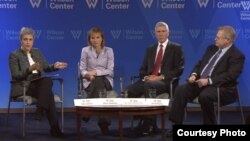The US could take a greater leadership role in Asia through climate change, experts and researchers say. At a discussion ahead of international climate talks in Paris, the Center for Climate and Security has released a new report, calling climate change a “threat multiplier” to security, economic prosperity and political stability.
Countries in the Asia-Pacific will be particularly vulnerable to climate change, particularly extreme weather. As the US makes a diplomatic turn to Asia, addressing climate change can be a part of the strategy, experts say.
The Center for Climate and Security’s report, The U.S. Asia-Pacific Rebalance, National Security, and Climate Change frames climate change as threat to national security, economic prosperity, and political stability to all countries across the world.
Countries in the Asia-Pacific are particularly prone to disasters. From 1970 to 2011, about 2 million people, or about 75 percent of fatalities caused by disasters globally, were killed because of extreme weather events.
Former US Pacific Commander Admiral Samuel J. Locklear III said climate change represents “catastrophic security implications” that must be addressed in the Asia-Pacific, where they will likely have an impact on US interests.
Sherri Goodman, president and CEO of the Consortium for Ocean Leadership, said that when it comes to climate change, each country in the Asia-Pacific faces a wide range of challenges. “It has different set of issues, whether it is sea level rise, more extreme weather events, how these would affect their infrastructure, energy, food, or water, and also how the local society wants to cope with it.”
That means a chance for the US to enhance its influence by “being sensitive to those needs and developing the right kind of partnerships, not only by bilateral U.S. and the individual country, but also the region as a whole, because it is not going to be one solution here.”
National security, resource scarcity and mass migration are all potential outcomes under climate change. That presents both challenges and opportunities, said Marcus King, a professor of international affairs at George Washington University. “So the idea of migration and depletion of fish stocks, on the one hand, can be a catalyst for conflict, but on the other hand, presents a great opportunity for them to work together on building a peaceful environment,” he said.
Cooperation between the US military and other states is one way to help in the climate change question, he said. The US has global reach with its military, which means it can come to the aid of any country in the Asia-Pacific, he said.




